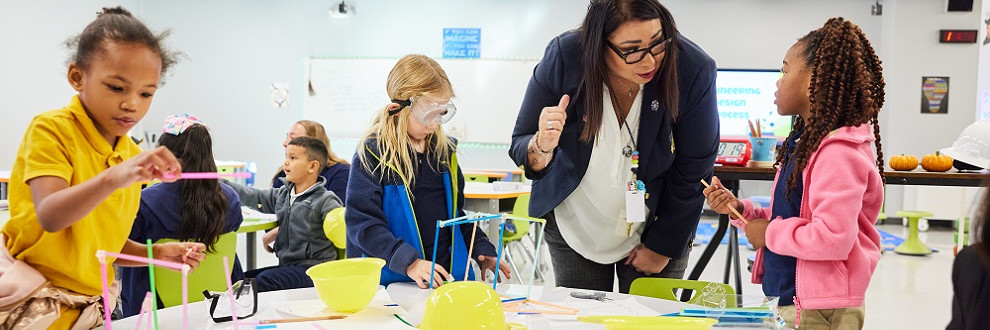
Toyota and D-FW partners create new education model with West Dallas STEM School
Children are curious. Nourish that curiosity with dynamic, engaging lessons, teacher development and on-site support services, and it’s a recipe for future success.
With that premise, Dallas Independent School District, Southern Methodist University (SMU), and the Toyota USA Foundation, in collaboration with nonprofits and the local community, began a new effort in 2018 to co-create a pre-K through eighth grade school in West Dallas called the West Dallas STEM School (WDSS).
The goal of the new school, which emphasizes an education in science, technology, engineering and math, is to offer project-based, hands-on learning; evidence-based educational practices; on-site community support services; and more. When the school first opened, it served only seventh- and eighth-grade students; this year, pre-K, kindergarten and first-grade students were added. The remaining grades will be added each year going forward as the school, formerly known as Pinkston High School, undergoes renovations.
A $35 million Dallas ISD budget was allocated in the 2015 bond program for the school renovation, including new classrooms and learning spaces, as well as new STEM labs, among other enhancements. But that was just the beginning. The Toyota USA Foundation also provided grants to SMU for teacher and curriculum development, plus project coordination. Additionally, Toyota has begun working with area nonprofits to address broader issues that impact learning, ranging from mobility to literacy and food insecurity, allocating several employees, as well as more than $10 million to date, to the effort.
Addressing the STEM skills gap through hands-on learning
The data driving the school’s curriculum tells a stark tale of the urgent need for STEM and other science- and tech-focused programs. According to current projections, up to 3.5 million high-tech manufacturing and other STEM-related jobs will be added to the U.S. economy over the next decade. But up to 2 million of those jobs will go unfilled due to a lack of skilled workers — a problem of national scale. In other words, the future is already here.
Pivotal to WDSS’ educational model, which is designed to help close the STEM skills gap, are the school’s two innovative multisensory STEM labs, which debuted this past August — one for the elementary school and one for the middle school, each with its own dedicated space.
The brightly colored labs feature multiple modular workstations that can be adapted to the experiment at hand, with overhead power supplies to power work at each station. The labs are makerspaces, custom-built for both students and educators, that latter of whom can regularly dream big as they craft their lesson plans.
Images of inspirational scientists, including the three female African American NASA mathematicians who were the subjects of the movie “Hidden Figures,” line the walls leading to the two state-of-the-art labs that Principal Marion Jackson affectionally calls “STEM Alley.”
In it for the long-haul
Support outside the classroom is just as important as the resources within it. In West Dallas, a network of additional programs aims to reduce barriers that impact learning, such as food insecurity, literacy gaps and a lack of transportation.
The planning for the West Dallas STEM School includes an on-site food pantry and learning garden created with Brother Bill’s Helping Hand, as well as a host of before- and after-school programs. A gift from business leader Carter Creech, an SMU alumnus with a passion for education philanthropy, will go toward establishing a comprehensive college and career readiness program that will begin in elementary school and continue through the middle school grades.
Beyond the walls of the school, Toyota is also working to address other issues that impact learning, including mobility and literacy.
The Toyota supported ride-share service Circuit has launched an on-demand free transportation service for West Dallas residents. The service helps people connect to local transit, as well as neighborhood-level trips, such as going to the grocery store or a doctor’s appointment.
In other unique engagements, Toyota is also working with longstanding partner National Center for Families Learning (NCFL) to support family success through education and literacy. Additionally, Toyota expanded an after-school writing program called 826 to the West Dallas community. Students participating in the writing program this year recently became published authors.
Going national
What Toyota USA Foundation began in West Dallas is now spreading to 15 communities across the country through an initiative launched by the Foundation called Driving Possibilities. Backed by a $110 million dollar commitment, the Foundation is looking to replicate the work in West Dallas.
